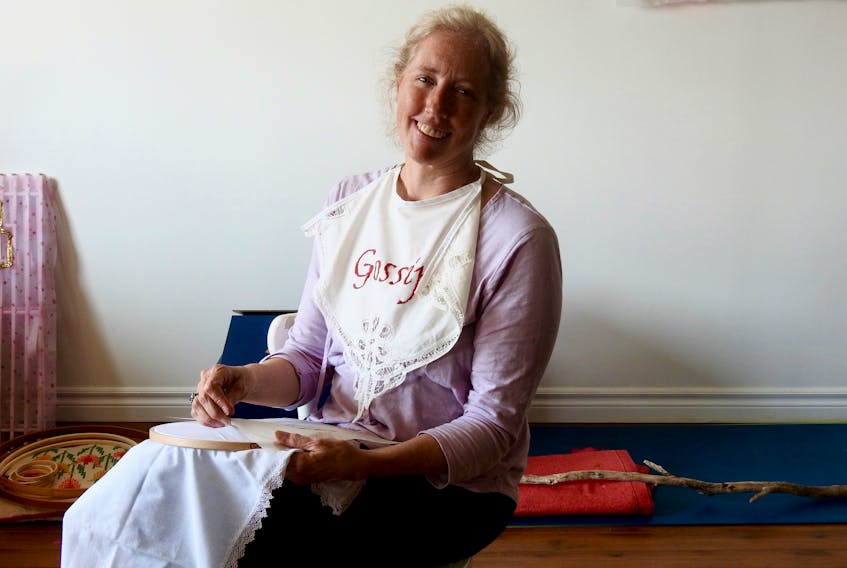GILLAMS, N.L. — Artist Robyn Love is collecting the stories of women and hopes her project gives other women a feeling of acknowledgment and encouragement to tell their stories and those of their ancestors.
She says the intent is to show their ancestors’ lives had meaning and were important and worthy of knowing and speaking aloud. “And that their voice is important.”
Originally from the United States, Love has lived in Gillams on the north shore of the Bay of Islands for almost 20 years.
It’s an extension of a project called “Branks," based on the medieval cage-like device, sometimes called a scold’s bridle, that was put on a woman’s face, often by her husband, with a plate in her mouth so she couldn’t speak.
Her artwork is site-specific and includes the participation of whoever is in that place.
“I get interested in a place and the people of that place and then create a project that will bring out the story of that place,” she said.
This summer, Love is the Grenfell Art Gallery’s artist in residence and is working on a project she’s titled “Filling Out Memory.”
It’s an extension of a project called “Branks” that she’s been working on with funding from ArtsNL and is based on the medieval cage-like device, sometimes called a scold’s bridle, that was put on a woman’s face, often by her husband, with a plate in her mouth so she couldn’t speak.

There was an element of public humiliation with the use of the scold’s bridle as a woman would be led through the street while wearing it.
Love’s project took the horror of that and turned it 180 degrees. She made things that women could put on their faces that make noise, rather than silencing them.
Before COVID-19 hit she was taking the pieces around province, meeting with groups of women and having them try on her delicate and fragile items. That led to conversations about the women’s experiences with either having a voice or being silenced.
“Based on that I’d heard so many amazing stories. People started talking about their mothers and grandmothers, how they lived, how they were really strong in the face of a lot of difficulty and oppression.”
In her research, she also discovered something about the word gossip. “Which we see basically as the thing you don’t want to be.”
Gossip comes from Godsibd, and old English word for a woman who was close to God and was revered in a community. They were the ones other women in a community would turn to for advice.
Godsibd changed to mean something no one wants to be called around the time the scold’s bridle started to be used. It was a way to keep women from getting together and talking amongst themselves.
Love wanted to collect the stories she was hearing in a more formal way and to resurrect the word gossip to its original meaning.
So far, she has about eight stories of women — some ordinary, some not — from Europe, Canada and the United States and would love to have more local ones.
On Aug. 22 (Aug. 23 if it rains) at 1 p.m. she’ll present an outdoor performance on the Colette Urban Memorial Walking Trail in McIver’s where those stories will be spoken.
“We’re going to speak the stories into the megaphones with the idea it will go out into the universe. Sort of fill out our memory so that we no longer have such an incomplete understanding.”
Laura Park’s story of her mother, Ruby (Wells) House, is one of the ones that will be spoken.
Park has been fascinated with Love’s work for a long time. The two are neighbours and Love’s house was once owned by Park’s uncle.
“She’s amazing in what she does,” said Park.
So, when she saw a post by Love about “Filling Out Memory” on Facebook, Park was intrigued. She said it was about women being strong, building each other up, but also knowing where they came from. “And the strong women that we have memories of.”
Her mother is the strongest woman she ever knew, and Park felt it was important to share that.
Ruby House died in 2009 and her story has many chapters. She lost her parents to tuberculosis before she was five, was raised by a great aunt, was a teacher and a social worker, a minister’s wife, adopted a child while pregnant with Park, found out she needed heart surgery on her honeymoon, had four heart surgeries, had a stroke when she was 36 and battled mental illness.
“And still became the strongest woman I ever knew,” a strength Park says her mother passed on to her.
She said her mother never thought “why me.”
“She never, ever complained.”
Park said it feels it’s good to talk about her mother’s story and wonders who else has stories to share.
To find out how to become a part of “Filling Out Memory” — either to share a story or participate in the event live or virtually — contact Love at [email protected].









